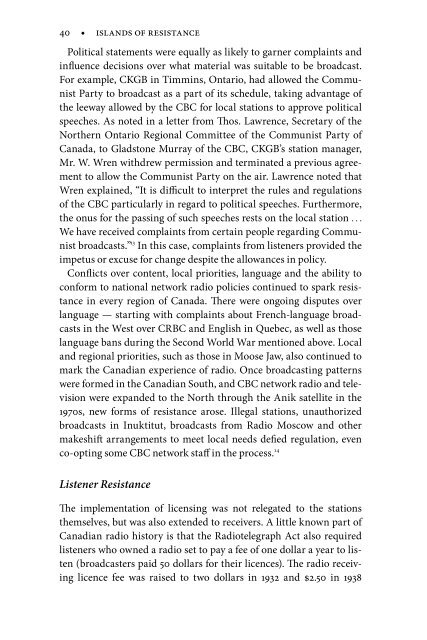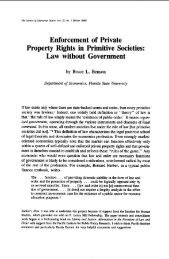Andrea Langlois et al - Islands of Resistance - Pirate Radio in Canada
Andrea Langlois et al - Islands of Resistance - Pirate Radio in Canada
Andrea Langlois et al - Islands of Resistance - Pirate Radio in Canada
You also want an ePaper? Increase the reach of your titles
YUMPU automatically turns print PDFs into web optimized ePapers that Google loves.
40 • islands <strong>of</strong> resistance<br />
Politic<strong>al</strong> statements were equ<strong>al</strong>ly as likely to garner compla<strong>in</strong>ts and<br />
<strong>in</strong>fluence decisions over what materi<strong>al</strong> was suitable to be broadcast.<br />
For example, CKGB <strong>in</strong> Timm<strong>in</strong>s, Ontario, had <strong>al</strong>lowed the Communist<br />
Party to broadcast as a part <strong>of</strong> its schedule, tak<strong>in</strong>g advantage <strong>of</strong><br />
the leeway <strong>al</strong>lowed by the CBC for loc<strong>al</strong> stations to approve politic<strong>al</strong><br />
speeches. As noted <strong>in</strong> a l<strong>et</strong>ter from Thos. Lawrence, Secr<strong>et</strong>ary <strong>of</strong> the<br />
Northern Ontario Region<strong>al</strong> Committee <strong>of</strong> the Communist Party <strong>of</strong><br />
<strong>Canada</strong>, to Gladstone Murray <strong>of</strong> the CBC, CKGB’s station manager,<br />
Mr. W. Wren withdrew permission and term<strong>in</strong>ated a previous agreement<br />
to <strong>al</strong>low the Communist Party on the air. Lawrence noted that<br />
Wren expla<strong>in</strong>ed, “It is difficult to <strong>in</strong>terpr<strong>et</strong> the rules and regulations<br />
<strong>of</strong> the CBC particularly <strong>in</strong> regard to politic<strong>al</strong> speeches. Furthermore,<br />
the onus for the pass<strong>in</strong>g <strong>of</strong> such speeches rests on the loc<strong>al</strong> station . . .<br />
We have received compla<strong>in</strong>ts from certa<strong>in</strong> people regard<strong>in</strong>g Communist<br />
broadcasts.” 13 In this case, compla<strong>in</strong>ts from listeners provided the<br />
imp<strong>et</strong>us or excuse for change despite the <strong>al</strong>lowances <strong>in</strong> policy.<br />
Conflicts over content, loc<strong>al</strong> priorities, language and the ability to<br />
conform to nation<strong>al</strong> n<strong>et</strong>work radio policies cont<strong>in</strong>ued to spark resistance<br />
<strong>in</strong> every region <strong>of</strong> <strong>Canada</strong>. There were ongo<strong>in</strong>g disputes over<br />
language — start<strong>in</strong>g with compla<strong>in</strong>ts about French-language broadcasts<br />
<strong>in</strong> the West over CRBC and English <strong>in</strong> Quebec, as well as those<br />
language bans dur<strong>in</strong>g the Second World War mentioned above. Loc<strong>al</strong><br />
and region<strong>al</strong> priorities, such as those <strong>in</strong> Moose Jaw, <strong>al</strong>so cont<strong>in</strong>ued to<br />
mark the Canadian experience <strong>of</strong> radio. Once broadcast<strong>in</strong>g patterns<br />
were formed <strong>in</strong> the Canadian South, and CBC n<strong>et</strong>work radio and television<br />
were expanded to the North through the Anik satellite <strong>in</strong> the<br />
1970s, new forms <strong>of</strong> resistance arose. Illeg<strong>al</strong> stations, unauthorized<br />
broadcasts <strong>in</strong> Inuktitut, broadcasts from <strong>Radio</strong> Moscow and other<br />
makeshift arrangements to me<strong>et</strong> loc<strong>al</strong> needs defied regulation, even<br />
co-opt<strong>in</strong>g some CBC n<strong>et</strong>work staff <strong>in</strong> the process. 14<br />
Listener <strong>Resistance</strong><br />
The implementation <strong>of</strong> licens<strong>in</strong>g was not relegated to the stations<br />
themselves, but was <strong>al</strong>so extended to receivers. A little known part <strong>of</strong><br />
Canadian radio history is that the <strong>Radio</strong>telegraph Act <strong>al</strong>so required<br />
listeners who owned a radio s<strong>et</strong> to pay a fee <strong>of</strong> one dollar a year to listen<br />
(broadcasters paid 50 dollars for their licences). The radio receiv<strong>in</strong>g<br />
licence fee was raised to two dollars <strong>in</strong> 1932 and $2.50 <strong>in</strong> 1938



